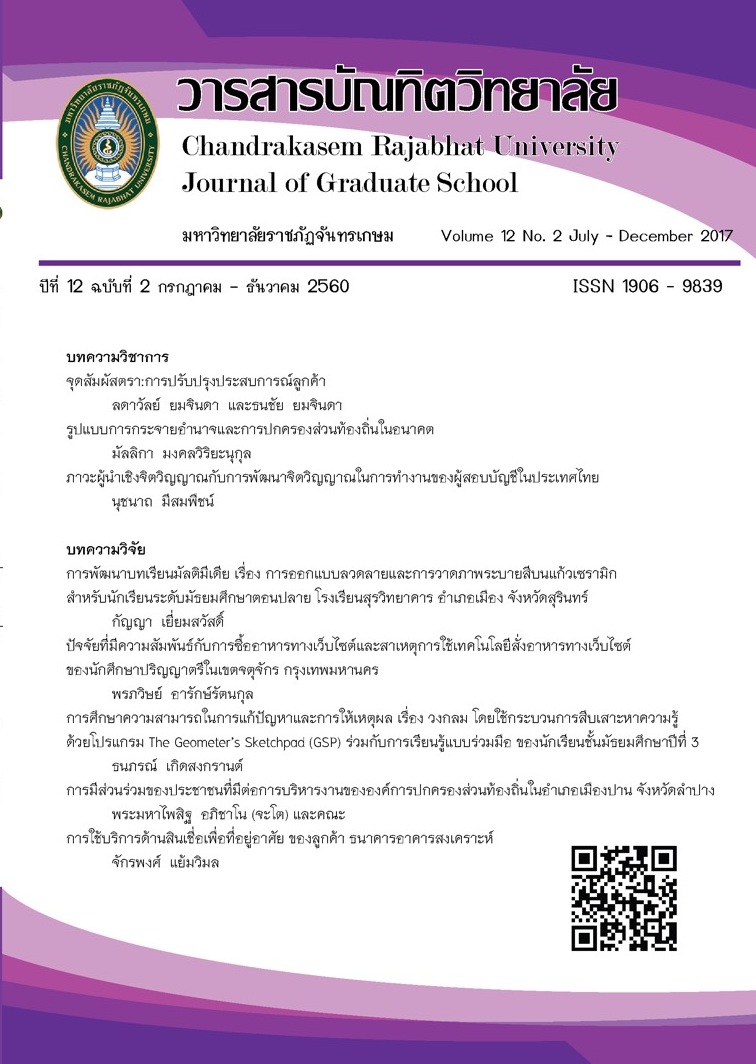ภาวะผู้นำเชิงจิตวิญญาณกับการพัฒนาจิตวิญญาณในการทำงานของ ผู้สอบบัญชี ในประเทศไทย
Main Article Content
บทคัดย่อ
บทความนี้มีวัตถุประสงค์ (1) เพื่อศึกษาสภาพปัจจุบันของผู้สอบบัญชี (2) เพื่อศึกษาทฤษฏีภาวะผู้นำ
เชิงจิตวิญญาณ และ (3) เพื่อนำทฤษฎีมาพัฒนาจิตวิญญาณในการทำงานของผู้สอบบัญชี ในประเทศไทย เนื่องจาก
วิชาชีพผู้สอบบัญชีรับอนุญาต (CPA) ถึงแม้เป็นวิชาชีพที่อิสระแต่ถูกกดดันด้วยเนื้องานและระยะเวลาที่จำกัดจนเกิด
เป็นภาวะความเครียด ผนวกกับปัญหาการลาออกของผู้สอบบัญชีในบริษัทตรวจสอบบัญชี ที่ต้องการทำงานที่ท้าทาย
ต้องการความก้าวหน้าในชีวิตจึงส่งผลให้ปัจจุบันผู้สอบบัญชีเป็นวิชาชีพที่ขาดแคลน จากปัญหาที่เกิดขึ้น ผู้นำจึงเข้ามา
มีบทบาทสำคัญในการคิดหาแนวทางเพื่อแก้ไขปัญหาดังกล่าว ซึ่งสอดคล้องกับทฤษฎีภาวะผู้นำเชิงจิตวิญญาณ
ซึ่งเป็นทฤษฎีสำหรับผู้นำในศตวรรษที่ 21 ที่จะช่วยให้องค์การเกิดการเปลี่ยนแปลงไปในทิศทางเชิงบวก กล่าวคือภาวะ
ผู้นำเชิงจิตวิญญาณเป็นตัวช่วยในการปรับสภาพแวดล้อมในการทำงานให้ดีขึ้น และพัฒนาผู้สอบบัญชีให้รู้ถึงคุณค่า
ความสำคัญ และความหมายในงานที่ปฏิบัติอย่างแท้จริง เพื่อให้สามารถปฏิบัติงานได้อย่างมีประสิทธิภาพยิ่งขึ้น
ซึ่งหากศึกษาเฉพาะด้านผู้นำโดยไม่ศึกษาเข้าไปถึงจิตวิญญาณความเป็นผู้นำแล้วนั้นถือว่าเป็นการศึกษาด้านผู้นำ
ที่ยังไม่สมบูรณ์ โดยการประยุกต์ใช้ทฤษฎีภาวะผู้นำเชิงจิตวิญญาณกับผู้สอบบัญชี ในประเทศไทยนั้น ผู้นำต้องมี
การสื่อสารที่ดี สร้างความเชื่อมั่น คอยสนับสนุนให้ผู้สอบบัญชีเกิดความศรัทธาต่อวิชาชีพอย่างแท้จริง
ด้วยการเป็นแบบอย่างที่ดีแก่ผู้สอบบัญชี
Article Details
เอกสารอ้างอิง
อาภากร สมรรถนเรศวร์. (2560). ตัวแทนหัวหน้าผู้สอบบัญชี. กรุงเทพฯ: สัมภาษณ์โดย นุชนาถ
มีสมพืชน์.
อายะวดี ซันประสิทธิ์. (2560). อาจารย์หลักสูตรบัญชีบัณฑิต. กรุงเทพฯ: สัมภาษณ์โดย นุชนาถ มีสมพืชน์.
Ahlijah, G. K. (2014). Exploring the Effectiveness of Spiritual Leadership in Entrepreneurial Firms in
Ghana. Doctor of Philosophy in Organizational Leadership. Regent University.
Anderson, L. E. (2015). Relationship between Leadership, Organizational Commitment, and Intent to
Stay Among Junior Executives. Doctor of Business Administration. Walden University.
Bindlish, P., Dutt, P., & Pardasani, R. (2012). "From growing convergence of spirituality and leadership towards
a unified leadership theory. Journal of Spirituality". Leadership and Management, 6(1). 3-22.
Chegini, M. G., & Nezhad, Z. F. (2012). "The effect of spiritual leadership and other elements on employees’
empowerment of Iran's bank: Case study of Guilan Province". African Journal of Business
Management, 6 (28), 8420-8434.
Choerudin, A. (2014). "The relationship between spirituality and work attitude: A empirical study. International".
journal of management research and review, 4 (3). 455-463.
Coleman, P. H. (2015). A Phenomenological Study of Spiritual Leadership. Doctor of Philosophy in
Leadership. Doctor of Philosophy, University of Central Arkansas.
Dehaghi, M., R., Goodarzi, M., & Arazi, Z., K. (2012). "The effect of spiritual values on Employees'
organizational commitment and its models". Procedia-Social and Begavioral Sciences, 62. 159-166.
Fry, L. W. (2003). "Toward a theory of spiritual leadership". Leadership Quarterly, 14(6), 693-727.
Grzeda, M., & Assogbavi, T. (2011). "Spirituality in Management Education and Development: Toward an
Authentic Transformation". The Journal of American Academy of Business, Cambridge,
16(2). 238-244.
Gupta, M., Kumar, V., & Singh, M. (2014). "Creating Satisfied Employees Through Workplace Spirituality:
A Study of the Private Insurance Sector in Punjab (India)". Journal of business ethics, 122(1), 79-88.
Hunsaker, W. D. (2012). Spiritual Leadership as a Universal Construct: An Empirical Study of Fry's
(2003) Model of Spiritual Leadership in a South Korean Context. Doctoral dissertation of
Philosophy in Organizational Leadership. Regent University.
Javanmard, H. (2012). "The impact of spirituality on work performance". Indian journal of science and
technology, 5(1), 1961-1966.
Jurkiewicz, C. L., & Giacalone, R. A. (2004). "A Values Framework for Measuring the Impact of Workplace
Spirituality on Organizational Performance". Journal of Business Ethics, 49, 129-142.
Karakas F. (2009). "New Paradigms in Organization Development: Positivity, Spirituality, and Complexity".
Organization Development Journal, 27(1). 11-26.
Khanifar, H., Jandaghi, G., & Shojaie, S. (2010). "Organizational consideration between spirituality and
professional commitment". European Journal of Social Sciences, 12(4), 558-571.
Middlebrooks, A., & Noghiu, A. (2010). "Leadership and spiritual capital: Exploring the link between individual
service disposition and organizational value". International Journal of Leadership Studies,
6(1), 67-85.
Mohla, C & Aggarwal, S. (2014). Spiritual Leadership and its Potential Danger at Workplace: a Review
a Article". International Journal of Organizational Behavior & Management Perspectives.
3(3). 1076-1086.
Nasina, M. D., Pin, D., & Pin, K. (2011). "The workplace spirituality and affective commitment among auditors in
big four public accounting firms: does it matter?". Journal of global management, 2(1) 216-226.
Reave, L. (2005). "Spiritual values and practices related to leadership effectiveness". The leadership quarterly,
16(5), 655-687.
Roberts, G. E. (2013). "Leadership coping skills: Servant leader workplace spiritual intelligence". Journal of
Strategic Leadership, 4(2), 52-69.
Salarzehi, H., Aramesh, H., & Mohammadi, M. (2011). "Organizational Spirituality and Its Impact on Consumption
Model of Employees in Governmental Organizations in Iran (Case Study). International Journal of
Business and Management, 6(1), 137-144.
Usman, A., & Danish, R. Q. (2010). "Leadership spirituality in banking professionals and its impact on
organizational commitment". International Journal of Business and Management, 5(3), 185-193


